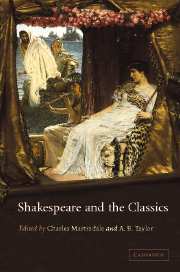Book contents
- Frontmatter
- Contents
- Notes on contributors
- List of abbreviations
- Introduction
- PART I AN INITIAL PERSPECTIVE
- PART II ‘SMALL LATINE’
- PART III ‘LESSE GREEK’
- 10 ‘Character’ in Plutarch and Shakespeare: Brutus, Julius Caesar, and Mark Antony
- 11 Plutarch, Shakespeare, and the alpha males
- 12 Action at a Distance: Shakespeare and the Greeks
- 13 Shakespeare and Greek romance: ‘Like an old tale still’
- 14 Shakespeare and Greek tragedy: strange relationship
- PART IV THE RECEPTION OF SHAKESPEARE'S CLASSICISM
- Select bibliography (compiled by Joanna Paul)
- Index
10 - ‘Character’ in Plutarch and Shakespeare: Brutus, Julius Caesar, and Mark Antony
Published online by Cambridge University Press: 22 September 2009
- Frontmatter
- Contents
- Notes on contributors
- List of abbreviations
- Introduction
- PART I AN INITIAL PERSPECTIVE
- PART II ‘SMALL LATINE’
- PART III ‘LESSE GREEK’
- 10 ‘Character’ in Plutarch and Shakespeare: Brutus, Julius Caesar, and Mark Antony
- 11 Plutarch, Shakespeare, and the alpha males
- 12 Action at a Distance: Shakespeare and the Greeks
- 13 Shakespeare and Greek romance: ‘Like an old tale still’
- 14 Shakespeare and Greek tragedy: strange relationship
- PART IV THE RECEPTION OF SHAKESPEARE'S CLASSICISM
- Select bibliography (compiled by Joanna Paul)
- Index
Summary
JULIUS CAESAR
Nothing in Plutarch's Life of Julius Caesar or of Marcus Brutus quite prepares us for those extended soliloquies with which Shakespeare equips Brutus when he considers the justification for conspiring against the former enemy, who in Plutarch (but not in Shakespeare) has spared his life:
It must be by his death, and for my part,
I know no personal cause to spurn at him,
But for the general: he would be crown'd.
How that might change his nature, there's the question.
It is the bright day that brings forth the adder,
And that craves wary walking. Crown him – that!
And then, I grant, we put a sting in him
That at his will he may do danger with.
(Julius Caesar 2.1.10–17)Shakespeare makes no mention of the events that had previously set Brutus and Caesar against one another, but he emphasises the situation, which Brutus here addresses, and which is beginning to alarm others, whereby Caesar threatens to become more than ‘but a man’. These words, spoken later by the younger Pompey, naturally reflect that character's sense of grievance; none the less they state a viewpoint that was common enough, as Plutarch's pages demonstrate. Those pages, however, show themselves to be subject to variation, depending on which particular narrative we consult, for, as in Shakespeare, different arguments produce a different emphasis.
- Type
- Chapter
- Information
- Shakespeare and the Classics , pp. 171 - 187Publisher: Cambridge University PressPrint publication year: 2004
- 2
- Cited by

